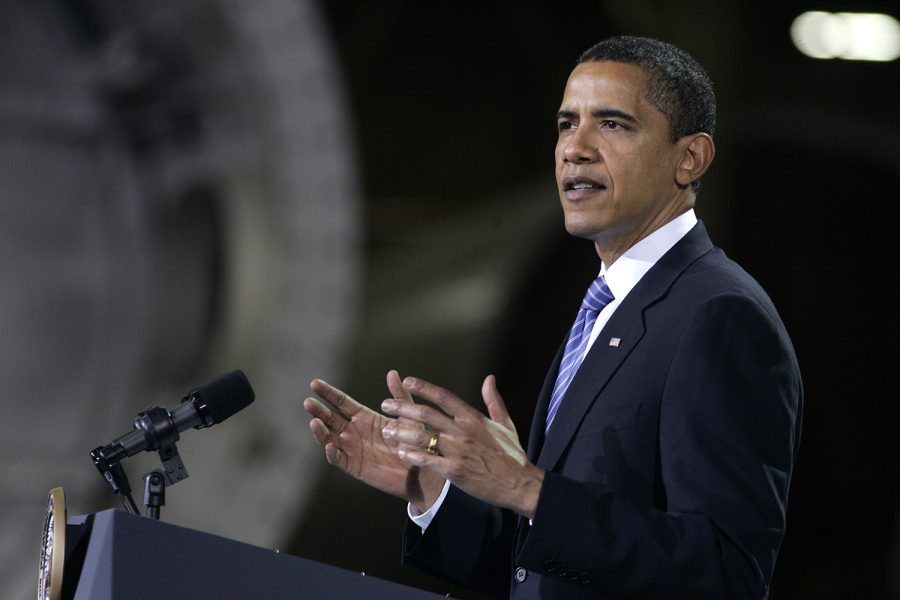Opinion: Even Obama isn’t for political correctness
Democrats should embrace Obama’s classical liberal views on free expression and reject radical leftists who want to shut it down.
President Barack Obama discusses energy plans during his visit to Newton, Iowa at the Trinity Structural Towers on April 22, 2009. The warehouse was once occupied by Maytag before it closed in 2006 and then was bought by Whirlpool.
November 5, 2019
During a speaking engagement with his foundation in Chicago last week, President Obama denounced wokeness and cancel culture.
“You know, this idea of purity and you’re never compromised and you’re always politically woke and all that stuff, you should get over that quickly,” Obama said.
He was right to say that canceling people is not activism, and it doesn’t bring about change in any meaningful way. It’s an intolerant regression to the times when the Catholic Church persecuted Galileo for his unconventional view that Earth was not the center of the universe.
Fortunately, I have encountered nothing close to that because of my conservative identity during my time at the University of Iowa. Turning Point USA Founder Charlie Kirk, a very controversial right-wing speaker, held an event here Oct. 23 without much apparent disruption.
Like Pope Urban VII, the self-righteous wokescolds seek to impose their questionable views and shifty standards on the rest of society by silencing dissenters with labels. They are a truly miserable bunch, perpetually indignant and constantly seeking out new reasons to be offended. In 1633, those who disagreed were shunned as heretics. Puritans in the modern West shut down their opponents with dishonest labels such as “racist” and “fascist.” The lax use of these terms has rendered them almost meaningless.
In late June, certain opponents chastised former Vice President Joe Biden for having friendly working relationships with segregationist senators throughout his career. Biden did his part to advance civil rights as a politician. What else was he supposed to do — scream “racist!” and throw milkshakes when he saw them in the cafeteria?
The political issues that divide Americans are serious. On rare occasions these topics, such as abortion or illegal immigration, are worth yelling about when debates get heated.
What Obama got right last week was crucial: Closing one’s ears to different viewpoints or arbitrarily labeling political opponents as racist hinders discussions that lead to workable solutions. Ruining careers over dusty college yearbook photos or feigning explosive outrage over events that happened more than a decade ago is counterproductive and benefits no one — except perhaps the losers at Media Matters who dig them up.
Defending the informal cultural freedom of expression, particularly on college campuses, is just as important as guarding our legal rights in the First Amendment.
Four years ago while speaking in Des Moines, Obama said college students shouldn’t be sheltered from conservative speakers or literature that might be offensive to certain groups. He was again correct — college should be a place where students have their ideas challenged rigorously. As a conservative, I don’t seek to silence those who disagree with me. I want to hear to the best version of their arguments and allow them a proper chance to change my mind.
This is the freest country on earth experiencing the most affluent period of human history, and the UI is an exceptional university. Yet there is probably someone walking across campus right now glaring at their high-speed handheld computer phone, angry about a tweet that someone they’ve never met and have no real connection to posted.
It was so refreshing to hear a prominent Democrat articulately dismantle cancel culture, which is nothing more than insipid virtue signaling. I’ll leave you with another pearl of wisdom from Obama: “If you’re tired of arguing with strangers on the internet, try to talk with one in real life.”
Columns reflect the opinions of the authors and are not necessarily those of the Editorial Board, The Daily Iowan, or other organizations in which the author may be involved.





